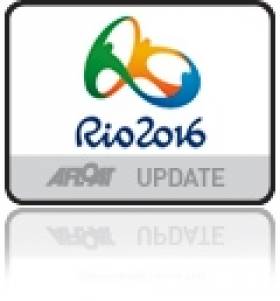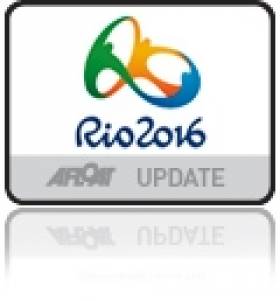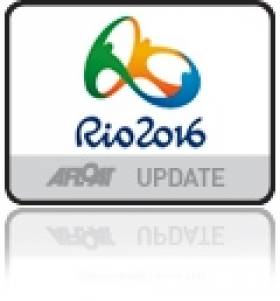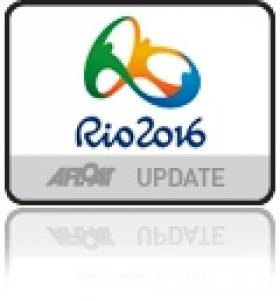Displaying items by tag: Olympics
Lynch Appeals Again For Rio Laser Trials Support
#Rio2016 - The National Yacht Club's Finn Lynch is urgently appealing for donations to fund his trip to the upcoming Olympic trials in Rio.
With the Irish Sailing Association (ISA) citing cost reasons for its decision not to bring boats to the next trail event at next summer's Olympic sailing venue, Lynch has yet again been moved to seek the support of family, friends and Ireland's sailing community.
It comes just months after a previous appeal that enabled him to secure invaluable training with Olympic gold medallists in Croatia.
The Laser sailor will need to charter his own boat for the trials which, along with flights, food and accommodation, will put his bill at around €10,000.
The NYC has more on Lynch's latest appeal HERE.
Seaton & McGovern Host Fundraising Gala For Rio 2016 Campaign
#Rio2016 - Ryan Seaton and Matt McGovern still face a huge funding shortfall in their Rio 2016 campaign, as BelfastLive reports.
Despite launching a raffle over the summer to help raise the money they need to shoulder the costs of training at home and abroad, as well as taking part in international competitions in the months leading up to next summer's Olympics, the Belfast Lough 49er duo are still short some £50,000 (€68,000).
"We get funding from Irish Sports Council and from Sport NI but as you know there were a lot of funding cuts in Sport NI this year," said Seaton, who added that the cuts "hit us quite hard because we are at the elite level and we rely on the funding because in sailing, the equipment costs are massive and with going to Rio and the travelling involved with training, the costs are crazy."
The duo, who are holding another fundraiser, a gala at Carrickfergus Sailing Club, this coming Saturday (24 October), even say they are "rapping on doors" for any sponsorship they can muster.
The news comes as Howth Yacht Club's Aoife Hopkins launches her own crowdfunding campaign to support her Rio 2016 bid in the Laser Radial, just months after fellow youth sailor Finn Lynch was moved to put cap in hand for his own Olympic aspirations.
Jegou's Penalty-Free Run Not Fast Enough To Secure Olympic Place
#Canoeing: Ireland C1 paddler Liam Jegou finished outside the top 10 nations at the canoe sprint World Championships in Lee Valley in England today and missed out on this chance of qualifying the boat for the Olympic Games. Jegou went off second in his semi-final and had a penalty-free run down the course, but his time of 106.29 seconds was not fast enough to stand in the top 10 nations. Jegou came in 27th, ahead of Italy and Canada. Spain, Portugal and Australia also missed out.
Canoe Slalom World Championships, Lee Valley, London, Day Five (Irish interest)
Men
C1 – Semi-Finals (10 to Final): 27 L Jegou 106.29
K1 – Team Final: 19 Ireland 161.62
Blame Local Leaders Over Rio Pollution Woes Says British Sailing Chief
#Rio2016 - The blame for Rio's pollution woes should fall squarely on local political leaders and not on sporting bodies, according to the head of Britain's sailing team.
As Scuttlebut Sailing News reports, Stephen Park says the press should turn its attention to those responsible for the notorious pollution problems in Guanabara Bay – the sailing and windsurfing venue for the 2016 Olympic Games – rather than place the burden on sailing's country leaders to withdraw from the venue.
Park's comments come in the wake of news that another sailor was hospitalised after the recent Aquece test event with a bacterial infection believed contracted in Rio's waters.
According to Sail-World, 49er bronze medallist Erik Heil was treated for severe inflammations in his legs and one hip which he says began on his journey home from Rio.
And the sailor has explicity blamed his illness on the waters of Marina da Glória, where wastewater from the city's hospitals flows openly into the bay, and has had his case taken ip by the German Olympic Sports Confederation, as the Guardian reports.
Heil's post-Rio illness follows that of Kiwi 470 sailor Jo Aleh, who missed three races at Aquece over a bug alleged to be connected with water contamination, and South Korean windsurfer Wonwoo Cho, whose hospitalisation came just days after the ISAF's latest threat to move Olympic sailing events to a new course in the Atlantic.
As previously reported on Afloat.ie, a recent investigation into water quality at the current Olympic sailing venue found that athletes are "almost certain to come into contact with disease-causing viruses".
US 49er Sailor Trevor Moore Missing Off Florida
#Missing - An Olympic sailor from the US who competed in the 49er class at London 2012 has gone missing in Florida's Biscayne Bay, as The Guardian reports.
Last night (Saturday 27 June) the US Coast Guard suspended its search for 30-year-old Trevor Moore, who competed with skipper Eric Stork in the same class as Irish Olympians Ryan Seaton and Matt McGovern.
An inflatable dinghy containing Moore's belongings was found adrift at Dinner Key in Miami on Thursday evening (25 June), prompting a massive search operation over 510 square miles.
US Sailing Statement On The Disappearance of London 2012 Olympian Trevor Moore -
FOR IMMEDIATE RELEASE
June 28, 2015
The US Coast Guard (USCG) announced on Saturday, June 27 the suspension of the search for London 2012 US Olympic sailor Trevor Moore (Miami, Fla.). Moore, 30, was last seen on Thursday, June 25 on a small motorboat in Biscayne Bay off Miami. Coast Guard search and rescue teams covered over 510 square nautical miles of territory and completed more than 29 search patterns since initiating the operation. The USCG was assisted by the Florida Fish and Wildlife Conservation Commission, City of Miami Police Department, the National Park Service, Miami Dade County Fire Rescue, and dozens of local volunteers. The volunteer search is ongoing.
"We are deeply saddened by Trevor's disappearance on Biscayne Bay, and wish to extend our sympathies to the Moore family," said Josh Adams, Managing Director of US Olympic Sailing. "In his time as a Laser and 49er sailor, Trevor has performed at a high level and made major contributions to the US Olympic sailing effort. He was a member of the 2012 Olympic team and several past editions of the US Sailing Team Sperry, a teammate and friend to many. In addition to the US Coast Guard's highly professional search for Trevor on Biscayne Bay, an extensive volunteer effort was organized and led by sailors on all manner of craft, which is a testament to the impact Trevor has had on the sailing community. Our thoughts are with his fiancée Libby Patton and the entire Moore family."
After winning College Sailor of the Year honors for Hobart and William Smith Colleges in 2007, Moore competed in the Beijing 2008 Olympic Trials in the Laser class, finishing 4th. Moore later teamed up with Erik Storck (Huntington, N.Y.) and won selection for London 2012 in the two-man 49er class. After competing at the Olympic Regatta in Weymouth and Portland, UK, Moore switched from the crew position in the 49er to skipper, and campaigned for Rio 2016. He retired from campaigning in the Summer of 2014, and has remained involved in Olympic sailing as a coach.
The Florida Fish and Wildlife Conservation Commission will lead the ongoing investigation into Moore's disappearance.
– end –
#Rio2016 - Despite seeing "significant progress", International Olympic Committee officials have again expressed concerns over the readiness of Rio's sailing waters for next summer's Olympic Games amid controversy over pollution levels in Guanabara Bay.
As Euronews reports, city officials have been consolidating their clean-up efforts in competition areas despite those parts of Guanabara Bay being already declared safe by Rio 2016 organisers.
IOC president Thomas Bach said yesterday (Monday 8 June) in Lausanne that the committee's executive is "watching this situation very closely and we are expecting more information and more reports by the time of our next meeting, next month in Kuala Lumpur."
The latest news comes a month after Brazilian officials hurried to quash fears over water quality for competing sailors with a PR stunt that failed to impress local journalists – not to mention the ISAF's own concerns for the safety of its athletes.
In the meantime, as city officials continue to play catch-up, local community groups have taken up the slack with their own grassroots clean-up effort.
"Civil society is stepping forward where the government has failed," writes Shanna Hansbury in the Guardian. "From all corners of Rio de Janeiro, people are working towards the lasting legacy they were promised.
"Fishermen are reporting environmental crimes, engineers are developing new technologies, biologists are replanting mangrove swamps, and sailors are operating eco-boats to remove floating rubbish."
The Guardian has much more on the story HERE.
#Rio2016 - Brazil has hurried to squash growing fears over the safety of sailing waters for next summer's Rio Olympics – but one state official's dip in Guanabara Bay hasn't stemmed the backlash.
The Associated Press reports on the "televised stunt" last week that saw environmental secretary Andrea Correa dive into the waters where sailors are expected to race just over a year from now.
In the footage recorded for the news magazine show Fantastico – which previously aired a report highly critical of Rio's failure to fulfil its promises to clean up the notoriously polluted Guanabara Bay – Correa compared its waters to the popular beaches of "Ipanema or Barra".
But the PR exercise did not impress the Fantastico team, who stressed in their programme that the official selected the time and place for his dip, at high tide near the mouth of the bay in cleaner ocean water.
Commenting on the story at the Royal Cork YC website, Peter Webster – a chemist with the Environmental Protection Agency (EPA) – repeated concerns that Rio's sailing waters fall far short of European bathing water quality standards.
"For our Olympic competitors... these standards should be being demanded by the ISA or the relevant swimming national bodies," he says. "From the evidence I’ve seen of pollution in Guanabara Bay there is no way that water-sports of any kind should be being held there."
The ISAF has already suggested it could make a formal call to move Olympic sailing out of the city for the safety of athletes.
#Rio2016 - Annalise Murphy, James Espey, Ryan Seaton and Matt McGovern are already Rio-bound - but could their sailing venue at the 2016 Olympics be moved out of Guanabara Bay?
That's what the sport's world governing body has threatened to do if city authorities don't clean up their act, according to the Associated Press.
As previously reported on Afloat.ie, local Olympic officials have confirmed that the notoriously polluted waters of Brazil's largest city will not be fully cleaned as promised in time for next summer's Olympiad.
The sailing venue was slammed as "absolutely disgusting" by Irish Olympic sailing coach Ian Barker on a visit to Rio at the end of 2013.
Yet while hopes remained in the interim that city officials would make good on their assurances of safe and clean waters for sailors, those have been dashed in recent weeks – with safety concerns over floating rubbish and the discovery of a new 'super-bacteria' in one of the many sewage-filled rivers that flow into the bay.
That's not to mention similar worries over the venue for rowing and canoeing at the Rodrigo de Freitas Lagoon – recently the site of an extensive fish kill.
The situation has now prompted the ISAF to call on the International Olympic Committee (IOC) to step up the pressure on Brazil's politicians, with the sailing body's Alastair Fox claiming he and fellow officials were "frustrated with it all".
In a phone interview with the AP's Stephen Wade, Fox said: "We are going to review the situation and make some more recommendations – demands is probably the right word – to make sure things are done."
The ISAF's head of competitions also suggested that "if we have to race all the races outside the bay, if that's what it comes to, to ensure a fair regatta, then that's something we're going to explore and could do."
The AP has much more on the story HERE.
Dead Fish Clog Rio Olympics Rowing Venue
#Rio2016 - If you thought the news about Brazil's sailing waters for next summer's Olympic Games was bad, TheJournal.ie brings us a dire tale from the Rodrigo de Freitas Lagoon that's set to host rowing events for Rio 2016.
Going by its latest condition, with a fish kill incident resulting in many thousands of twaite shad clogging up the lake, there isn't much rowing or canoeing to be done at present.
Local photographer Alex Moutinho described the fish die-offs that occur on an annual basis as "one more Brazilian shame" - coming after news of a collision with floating rubbish at the sailing venue in Guanabara Bay that's renewed concerns for athletes' safety on the water.
TheJournal.ie has more on the story HERE.
Rio Sailing Waters Crash Renews Concerns Over Floating Rubbish
#Rio2016 - The safety of Olympic sailors training and competing in Rio's dirty waters has been called into question after a 49er pair crashed into a floating object in recent weeks.
As Yahoo! News reports, Breno Osthoff and Rafael de Almeida Sampaio were training on 14 February in Guanabara Bay – the location for the sailing courses in next summer's Olympiad – when they crashed into a discarded plastic box of the kind used to transport fish.
Video of the incident, which captured the duo's boat slamming into the box and causing their dinghy to list, will only add to the chorus of disapproval over the host city's failure to fulfil its promises to clean up its heavily polluted waters.
"The impact broke the keel, damaged the hull, and as we turned we fell on top of the sails and scraped the two sails," said Osthoff of the incident earlier this month. "The damage was very significant and it is just unacceptable."
Yahoo! News has more on the story HERE.


































































